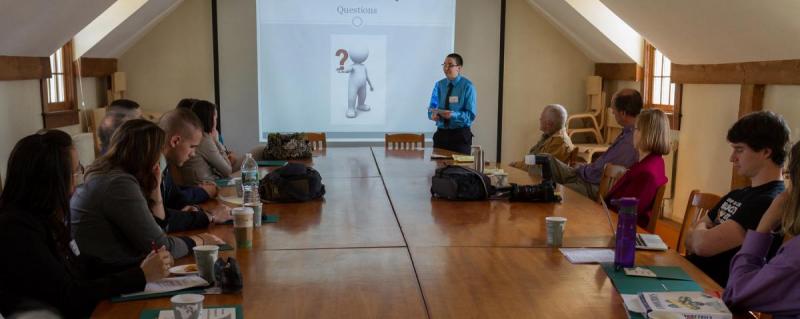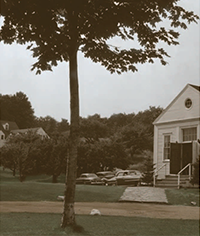
Each spring the Vermont Academy of Arts and Sciences (VAAS) sponsors the Vermont Intercollegiate Student Symposium, at which students from across the state present work in diverse areas of study. This year Marlboro College hosted the symposium for the first time, welcoming more than 40 student presenters and other visitors from six colleges across the state on April 14.
“The conference was a wonderful opportunity for students from different institutions to share their interests with each other and a wider audience,” said Kate Ratcliff, Marlboro professor of American studies and this year’s symposium orchestrator. “It was so gratifying to see classrooms across campus filled with students from colleges all over Vermont.” Kate is on the board of VAAS, which was organized in 1965 to foster wider and more intensive participation in the arts, humanities and sciences in Vermont.
In addition to 15 students from Marlboro, participants came from the University of Vermont, St. Michaels College, Norwich University, Castleton State College and Green Mountain College. The presentations, which were organized in panels of four students and took place all across campus, drew from the fields of history, literature, political science, math, psychology, dance, theater and visual arts.
“I tried to create panels that linked papers around a broad common theme or themes and that included participants from different institutions, in the hopes of fostering interdisciplinary and intercollegiate dialogue,” said Kate.
A literary studies panel moderated by writing professor John Sheehy included senior Brandon Willits’ analysis of wilderness themes in William Faulkner’s Go Down, Moses. “I was fascinated with the idea of wilderness as a transformative space, and when I initially approached Faulkner I definitely believed that wilderness was spiritual,” said Brandon. But, like Isaac McCaslin in Faulkner’s seminal collection of stories, Brandon developed a different perception of wilderness while working for the park service last summer. “It was really important to me to understand how Faulkner uses language to present wilderness as a transformative space and to reconcile that with my own ideas of physically living in a wild space.”
In the same panel, junior Sam Grayck talked about the trials of translating Antoine de Saint-Exupery’s The Little Prince from the French. Other Marlboro students who presented at the symposium included senior Alex Tolstoi, who discussed Charles Phelps and the politics of internal dissent in revolutionary Vermont, and junior Alexia Boggs, who talked about Plato and the occupy movement. In a panel called “Men, Women and Family in American Culture,” moderated by Kate, sophomore Emma Thacker discussed complex families and senior Jory Shareef addressed historic representations of women.
Marlboro was well represented in the panel on visual and performing art, with entries from seniors Logan Smith (theater), Zach Parks (sculpture), Katherine Trahan (theater) and Cookie Harrist (dance). A panel titled “Constructions of Self and Other” included junior Cameron Cobane’s study of German director Fatih Akin, sophomore Aiden Keeva’s analysis of poet Gary Snyder’s ethics of eating and freshman Haley Peter’s insightful look at the legend of Bigfoot.
“Bigfoot gave America a strengthened sense of identity during the paranoia of the Cold War, and he represented a hope that transcended the newly understood destruction of the wilderness,” said Haley.
Senior Willie Finkel presented “The War Within: Famine and the Confederacy,” and senior Lauren Dushay talked about mentoring in the LGBTQ community. Kate said, “Several of the Marlboro seniors who participated told me it was a wonderful opportunity to articulate and discuss their research in preparation for upcoming orals.” It was a great experience for everyone involved, although one student noted that a disadvantage to participating was missing out on the other panels. Hopes were high that it would not be another 47 years before Marlboro hosts the spring symposium again.

